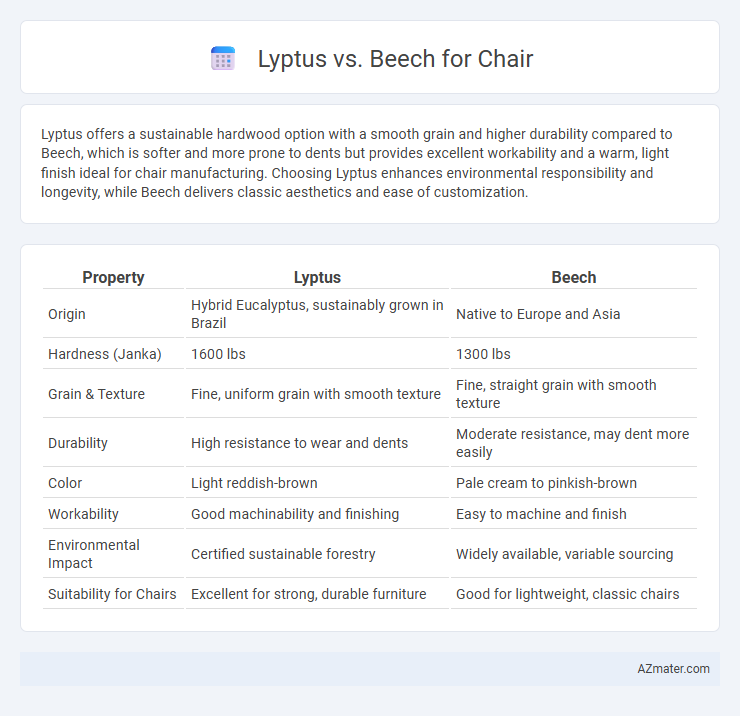Lyptus offers a sustainable hardwood option with a smooth grain and higher durability compared to Beech, which is softer and more prone to dents but provides excellent workability and a warm, light finish ideal for chair manufacturing. Choosing Lyptus enhances environmental responsibility and longevity, while Beech delivers classic aesthetics and ease of customization.
Table of Comparison
| Property | Lyptus | Beech |
|---|---|---|
| Origin | Hybrid Eucalyptus, sustainably grown in Brazil | Native to Europe and Asia |
| Hardness (Janka) | 1600 lbs | 1300 lbs |
| Grain & Texture | Fine, uniform grain with smooth texture | Fine, straight grain with smooth texture |
| Durability | High resistance to wear and dents | Moderate resistance, may dent more easily |
| Color | Light reddish-brown | Pale cream to pinkish-brown |
| Workability | Good machinability and finishing | Easy to machine and finish |
| Environmental Impact | Certified sustainable forestry | Widely available, variable sourcing |
| Suitability for Chairs | Excellent for strong, durable furniture | Good for lightweight, classic chairs |
Introduction to Lyptus and Beech Woods
Lyptus wood, derived from a hybrid of Eucalyptus globulus and Eucalyptus grandis, is known for its sustainability and rapid growth, making it an eco-friendly choice for chair manufacturing. Beech wood, sourced primarily from the Fagus sylvatica tree, is valued for its hardness, fine grain, and durability, often used in traditional and modern furniture. Both woods offer unique aesthetic and structural properties ideal for chairs, with Lyptus providing a smooth finish and beech contributing strength and longevity.
Botanical Origins and Characteristics
Lyptus is a hybrid hardwood derived from the Eucalyptus grandis and Eucalyptus urophylla species, known for its rapid growth and sustainable cultivation in plantations primarily located in Brazil. Beech, originating from the Fagus genus, commonly Fagus sylvatica in Europe and Fagus grandifolia in North America, is a dense hardwood prized for its fine grain, uniform texture, and excellent bending properties. Both woods exhibit durability suitable for chair construction, but Lyptus offers a more eco-friendly option due to its fast growth cycle, while Beech provides a traditional, smooth finish favored in classic furniture design.
Appearance and Grain Patterns
Lyptus features a consistent, light reddish-brown hue with a smooth, fine grain pattern that offers a sleek and modern appearance for chair construction. Beech typically presents a pale cream color with pink or reddish tones and exhibits a straight, uniform grain that provides a classic, warm look. The subtle grain complexity in Lyptus contrasts with the more pronounced patterns in Beech, influencing the chair's visual texture and style.
Durability and Strength Comparison
Lyptus wood offers high durability and remarkable strength, making it an excellent choice for chair construction with its resistance to wear and heavy use. Beech wood is also prized for its hardness and sturdiness, providing strong structural integrity and resistance to dents or scratches in furniture applications. When comparing durability and strength, Lyptus surpasses beech slightly due to its denser grain and enhanced stability, resulting in longer-lasting chairs under frequent use.
Workability and Machinability
Lyptus offers excellent workability with its uniform grain and smooth texture, making it easy to shape and sand, ideal for chair manufacturing. Beech is renowned for its superior machinability due to its fine, tight grain structure, allowing clean cuts and minimal tool wear during production. Both woods provide reliable performance, but Lyptus excels in finishing ease while Beech stands out in precise machining.
Sustainability and Environmental Impact
Lyptus wood, derived from fast-growing Eucalyptus trees, offers superior sustainability due to its rapid regeneration cycle and certification by the Forest Stewardship Council (FSC), minimizing deforestation risks. In contrast, Beech, while durable and strong, grows slower and often requires more extensive forest management, impacting biodiversity more significantly. Choosing Lyptus for chairs reduces carbon footprints and supports sustainable forestry practices compared to Beech's higher environmental strain.
Cost and Availability
Lyptus wood offers a cost-effective alternative to Beech for chair manufacturing due to its faster growth rate and sustainable harvesting practices, resulting in generally lower prices. Beech is widely available in Europe and North America, making it a reliable choice with consistent supply, whereas Lyptus, a hybrid eucalyptus grown primarily in South America, may have limited availability depending on the region. Manufacturers often consider Lyptus for budget-friendly projects, while Beech is preferred for its established presence and ease of sourcing.
Comfort and Performance in Chair Design
Lyptus offers a smooth, hard surface with inherent strength, providing excellent durability and resistance to wear in chair design, making it ideal for high-traffic environments. Beech wood delivers superior flexibility and shock absorption, enhancing comfort by promoting ergonomic support and reducing fatigue during extended use. Performance in chair design favors Lyptus for longevity and Beech for comfort, with each wood type catering to specific user needs and design priorities.
Maintenance and Longevity
Lyptus wood offers high resistance to moisture and scratches, making it easier to maintain and ideal for chair surfaces exposed to frequent use. Beech wood provides excellent durability with natural hardness, but it requires regular oiling or waxing to prevent drying and cracking over time. Both woods deliver strong longevity, but Lyptus demands less upkeep while maintaining a smooth, resilient finish.
Which Wood is Better for Chairs?
Lyptus offers a harder, denser wood with excellent durability and resistance to wear, making it ideal for high-traffic chair use. Beech features a fine grain and moderate hardness, providing comfortable seating with good shock resistance but less rigidity than Lyptus. For chairs requiring superior strength and longevity, Lyptus is generally better, while Beech suits applications prioritizing ease of shaping and a smooth finish.

Infographic: Lyptus vs Beech for Chair
 azmater.com
azmater.com